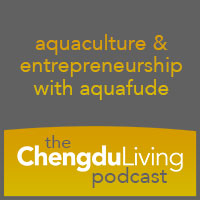 Aquafude are trying to change the way fish are raised and consumed in China. They’ve been going all over Western China changing the local fish farming practices, which includes measuring pollution levels, changing the feed provided to the fish, and much more. The result is a domestic product that they argue is fresher, healthier, and more delicious than anything else you can find in China.
Aquafude are trying to change the way fish are raised and consumed in China. They’ve been going all over Western China changing the local fish farming practices, which includes measuring pollution levels, changing the feed provided to the fish, and much more. The result is a domestic product that they argue is fresher, healthier, and more delicious than anything else you can find in China.
I talked with Ari Jadwin and Matt Tatkow from Aquafude about importing Chilean fish feed, what the 2008 earthquake has to do with the fish farming, and what it takes to convince local fisheries to embrace a sustainable mindset.
Topics discussed:
1:00 What is an aquaculture company and what does Aquafude do?
2:00 Working with farms in Western China
3:00 What the 2008 earthquakes has to do with today’s fish farms
4:30 What kind of fish are salmon trout and why are the good for mountain communities?
6:00 Why aren’t farmers in Western China raising traditional livestock?
8:15 How did Ari and Aquafude get involved with fish farmers?
11:00 Aquafude’s business proposition to local fish farmers
13:50 What were the barriers to selling this proposition to fish farmers?
16:00 How Aquafude expanded from selling just fish feed to the actual fish themselves
19:00 Who is buying these fish now
20:30 Aquafude’s entry into farm management
23:10 Are the farmers converted to appreciate sustainability now?
23:50 Becoming more hands-on with the farmers
24:30 From selling directly to consumers to selling online + imported fish in China
29:05 Interlude
30:05 The regulatory situation for fish farms in China and for imports
31:10 Changing trends in China
31:40 Numbers on fish farming and consumption in China and the world
33:50 The current scope of Aquafude’s operation and the future
36:00 The potential issues of scaling up
37:05 The size range of fisheries that Aquafude deals with
38:40 How does Aquafude find new fisheries?
40:30 What was the existing network of fisheries in Western China and how did/do they interact
42:30 Information sharing, consulting companies, and how they’re keeping fish healthy
44:00 Density of fisheries in China compared to in the West
45:30 How are Aquafude’s standards informed and enforced
48:30 Mercury levels in the feed and the farmed fish
50:30 What is Aquafude’s commitment to sustainability and why does it matter
Songs featured in this podcast
- Pastel (et aliae remix), by Ulzzang Pistol
- 25 Mile Bossa, by Skeewiff x Edwin Starr
- Be Easy (instrumental), by Ghostface Killah
Download & Stream Links
Download Podcast #11
Or click below to listen to the podcast now through your browser.
You can also search for the podcast in your favorite podcasting app (mine is Overcast, which we highly recommend for iPhone users).
If you enjoy the podcast, please share it! We look forward to recording more of these and continuing to chronicle and share the story of life in Chengdu.
Got an idea of what we should record our next podcast about? Let us know in the comments and if you like what you heard, like us on Facebook, follow us on Twitter, and stay tuned for the next one!
Great podcast. Surreal experience. “My fish aren’t dying! You son of a bitch!”
This was pretty educational for me, not knowing anything about this industry at all. I can see the challenge of doing something like this in China where there will naturally be a push against spending more to get things like sustainability and longevity out of a resource that is facing a scarcity problem. Aquafude is fighting the good fight though, I wish them luck. Thanks for recording and posting this, Dan.
Great podcast. One of the best so far.
Thanks Ian! It was a surprisingly fascinating topic for me, no doubt. I’ve always joked about eating fish in landlocked Sichuan – I had no idea that the fish farming community was as vital as it is or that there was so much potential. Seems like Aquafude has found a really promising niche food market and are approaching each challenge in a responsible way. I was also surprised to learn that, as put-together and professional as Ari is, he’s only 27 years old!
Interesting and impressive business venture. I’d be curious to know more about how they are navigating the usual hazards to foreigners doing business in China, especially the one relating to the fact you have to have a Chinese partner who owns 51% of the business.
They are probably navigating the hazards the same as other expat entrepreneurs in China: with great caution. But I am certain that it is not true that foreigners doing business in China need a partner who owns 51% of the company.
Wonderful action for communities, fish, and people. But question, Ari Jadwin and Matt Tatkow: what is the nutrition comparison to ocean fish or free-swimming fresh water fish? Most know the nutrition quality of farmed fish is much much less than those of free-swimming fish, due to multiple factors of the artificial environment. Any scienctific studies on the quality of nutrients the human body receives? Thank you!